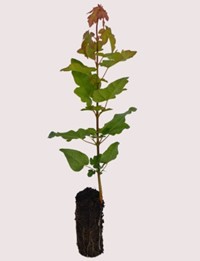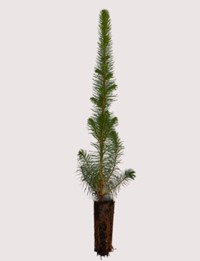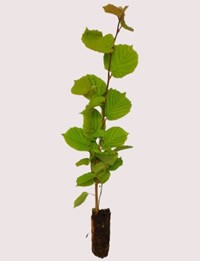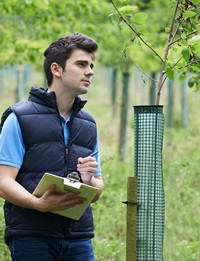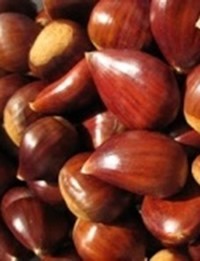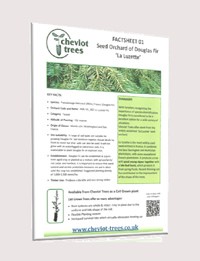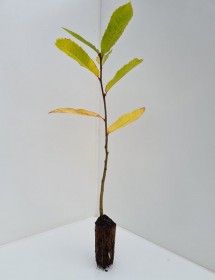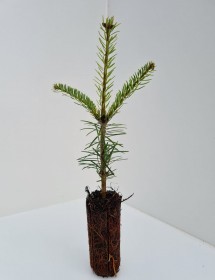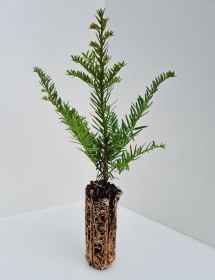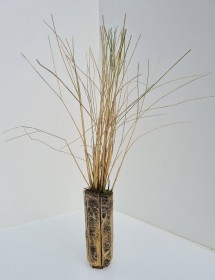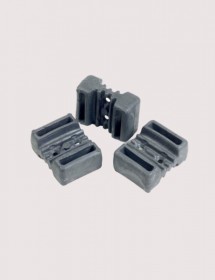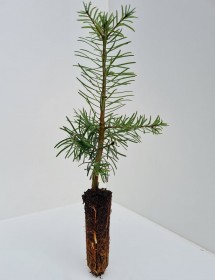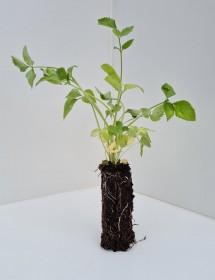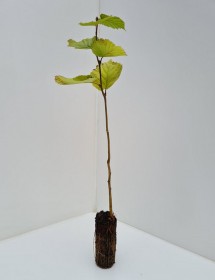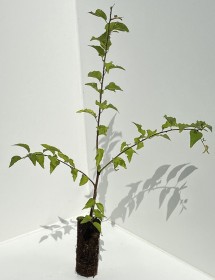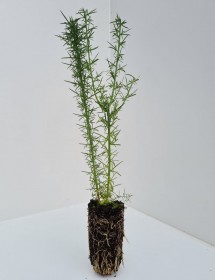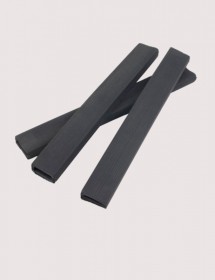Home
-
Populus nigra - Black Poplar
£2.03Populus nigra - Black Poplar is probably the rarest tree species in our range! Black Poplar is native to the UK and was once a common sight throughout the country but there are very few in existence.
Deciduous. Shiny green leaves which are heart shaped. Black Poplar is dioecious meaning male and female flowers are found on separate trees. The flowers are in the form of catkins which are red on male trees and yellow-green on females.
-
Castanea sativa - Sweet Chestnut
£2.03from £0.98Castanea sativa - Sweet Chestnut is a good example of a multi functional species. Excellent as a parkland tree, great for coppicing, and the chestnuts provide a tasty treat for red squirrels!
Native to Southern Europe but thought to be introduced by the Romans, Sweet Chestnut is found throughout the UK and is commonly associated with Southern England. Deciduous with long, narrow glossy leaves.
-
Quercus rubra - Red Oak
£1.93from £0.96Quercus rubra -Red Oak; its claim to fame is its fiery Autumn foliage colour. Native to North America but widely planted in the UK since its introduction in the 1700’s. The timber has less value than its native cousin’s but it is still an aesthetically pleasing firewood crop or it can be used as a parkland tree.
The leaves are similar in shape and size to the native Oaks but they are more pointed and spiked in appearance.
A fast growing species with a strong central leader. Red Oak doesn’t support as many species of wildlife as our native Oaks but it is still a popular choice with nesting birds and pollinators.
-
Picea pungens glauca - Blue Spruce
£1.89from £0.84We grow Picea pungens glauca - Blue spruce primarily for the purpose of Christmas tree production.
It is easy to see why this species is a popular choice. It has the traditional pyramid shape with stiff horizontal branches and a dense habit.
Slower growing then Norway spruce but worth waiting for!
The classic shape combined with attractive blue tinted needles makes it stand out when compared against other species – a premium choice.
We grow several other species of cell grown conifers which are all suited for Christmas tree production.
-
Abies nordmanniana - Nordman Fir
£1.89from £0.84Abies nordmanniana - Nordman Fir is the best selling species for Christmas tree production.
It has luscious soft dark green needles, a symmetrical shape, and excellent needle retention qualities.
We grow several other species of cell grown conifers which are all suited for Christmas tree production.
-
Rhamanus cathartica - Purging Buckthorn
£1.84from £0.89Rhamanus cathartica – Purging Buckthorn is a native small tree / large dense shrub with grey-brown bark and spiny branches.
Flowers are yellow green with four petals and are pollinated by insects. After pollination, the female flowers develop into black berries
Useful for woodland planting or hedging. The leaves of Purging Buckthorn are an important food source for tiger moth larvae and caterpillars of the Brimstone butterfly.
-
Ligustrum ovalifolium - Oval Leaved Privet
£1.84from £0.89Ligustrum ovalifolium – Oval leaf privet is a fast growing semi evergreen hedging species with glossy dark green leaves and creamy white flowers during the summer months.
A robust species which tolerates regular pruning. Also suitable for coastal locations although you may notice some defoliation during winter.
You may also wish to consider Wild Privet which has narrower leaves and a looser growing habit.
Creamy white flowers during the summer months.
-
Taxus baccata - Yew
£1.84from £0.98Native to the UK, Taxus baccata - Yew is a dense evergreen conifer with small green needles.
Used for hundreds of years in the UK to create hedging, the bright green spring growth matures to a dark green for a classical look. It can be easily shaped and makes an excellent screen for privacy.
It is often perceived to be a slow growing species but it is actually quite fast growing in its juvenile stage.
The normal spacing for hedge planting is around 3 plants per linear metre.
-
Symphoricarpos albus - Snowberry
£1.84from £0.89Symphoricarpos albus - Snowberry is a dense shrub that is fast growing and very tolerant of shade and poor soils.
It is often used for screening and is often favoured by game birds as it provides shelter and security.
Deciduous with light green leaves. Small pink flowers in July that turn to pearl white berries in the Autumn.
-
Rosa rugosa Alba - Ramanas Rose (White)
£1.84from £0.89Rosa rugosa Alba - Ramanas Rose is a large robust shrub that produces large, beautiful and very fragrant bowl shaped flower that are silky white. It flowers earlier than our native Dog Rose and often repeat flowers during the Spring and Summer. Very large, red hips follow the flowers.
The stems are covered in small spines which makes it ideal for an impenetrable and dense hedge or barrier.
A good all rounder. Attractive, good disease resistance, fast growing and very tolerant of exposure and coastal locations.
We also produce Rosa rugosa which has fuchsia pink flowers.
-
Rosa rugosa - Ramanas Rose (Pink)
£1.84from £1.10Rosa rugosa - Ramanas Rose is a large robust shrub that produces large, beautiful and very fragrant bowl shaped flower that are fuchsia pink in colour. It flowers earlier than our native Dog Rose and often repeat flowers during the Spring and Summer. Very large red hips follow the flowers.
The stems are covered in small spines which makes it ideal for an impenetrable and dense hedge or barrier.
A good all rounder. Attractive, good disease resistance, fast growing and very tolerant of exposure and coastal locations.
We also produce Rosa rugosa alba which has silky white flowers.
-
Cotoneaster lacteus - Milkflower Cotoneaster
£1.84from £0.89Cotoneaster lacteus - Milkflower Cotoneaster is a dense evergreen shrub that can be used for an informal hedge or screen.
Its main attraction is the clusters of creamy white flowers which persist all summer and then masses of red berries are produced in the autumn and stay on the plant until the winter.
This species has a wide arching habit with large leathery leaves with deep veins which have a furry underside.
-
Prunus padus - Bird Cherry
£1.83from £0.89Prunus padus - Bird Cherry is native to the UK and we tend to associate it with the northern part of the UK.
Tough and resilient with lots of value for wildlife and it provides an excellent show in the Spring in the Autumn.
Deciduous. Green leaves more oval like in shape than Wild Cherry turning yellow and orange in Autumn.
Almond scented stalks of blossom in the Spring which provide a good early nectar and pollen source for bees. Once pollinated, the flowers develop into reddish brown cherries with a bitter taste which are stripped from the trees by birds.
-
Fagus sylvatica - Green Beech
£1.83from £0.89Fagus sylvatica - Green Beech is one of the most widely planted broadleaved trees in Europe. A long lived species that is commonly used in the UK as a component in a mixed woodland, for hedging or for parkland planting due its very broad crown.
Smooth, silver grey bark. Dark green leaves turning yellow then copperin autumn. The leaves are retained on the plant during the winter if the plant is maintained as a hedge. If you are comparing Beech or Hornbeam for hedging and you have damp soil and or you are in a cold exposed area then we would suggest using Hornbeam.
-
Ammophila arenaria - Marram Grass
£1.76from £0.71We are specialist growers of Ammophila arenaria - Marram Grass plants from British seed for coastal erosion projects.
Marram Grass is our native coastal grass and it does a fantastic job of helping to stabilise sand dunes protecting coastal defences.
It grows from a network of underground rhizomes which give it a sturdy anchor to the sand and allow it to spread upwards.
Growing in stiff, hardy clumps the foliage is grey green in colour and it produces light brown flowerheads.
Suggested planting density: 5 plants per square metre.
-
Euonymus europeaus - Spindle
£1.75Spindle hedging plants provide a wonderful array of autumn colour. The four-lobed capsules burst into life with a vibrant shade of pink, opening to reveal orange fruits in the autumn. Euonymus europaeus hedging plants have dark green foliage that transforms into rich shades of red and yellow in autumn, adding another layer of colour to your garden. Spindle produces a dense hard wood that was traditionally used for making spindles and small implements.
A fast-growing species, Spindle is ideal for giving an array of colour to a hedge and is an excellent attractor of wildlife.
-
Quercus robur - Pedunculate Oak
£1.75from £0.85Quercus robur - Pedunculate Oak is an iconic species that supports more life than any other tree species in the UK. One of the most economically and ecologically important trees species in Europe.
Pedunculate (or English) Oak is a large deciduous tree with a broad spreading crown. The stalkless leaves have 4-5 deep lobes and the acorns grow on stalks or ‘peduncules’, hence the name.
Pedunculate Oak prefers lowland areas whereas Sessile Oak prefers wetter upland areas.
To protect and aid establishment of Pedunculate Oak you may wish to consider Tubex Combitube which is a ventilated shelter that provides an open, airy environment for producing Oak.
-
Quercus petraea - Sessile Oak
£1.75from £0.85Quercus petraea - Sessile Oak is similar to English Oak although it prefers wetter upland areas. One of the most economically and ecologically important trees species in Europe.
Sessile Oak is a large deciduous tree with a broad spreading crown.
The stalked leaves have 4-5 deep lobes and stalkless acorns.
Sessile Oak is long lived so it makes a great choice for avenues and specimen tree planting.
-
Rubber Tree Cushions
£1.74from £1.54Rubber Tree Cushions are manufactured from soft rubber with two preformed slots to allow strapping to feed through and two concave surfaces to allow a snug fit between the tree and stake.
Use on combination with our Tree Strapping Rolls.
-
Salix fragilis - Crack Willow
£1.73from £1.04Salix fragilis - Crack Willow is a deciduous medium sized tree which is native to the UK. Very robust and fast growing.
Glossy, dark green lanceolate leaves with yellow/green catkins which later turn brown. Grows on most soils and is ideally suited to damp areas such as water margins, and the edges of marsh areas.
Crack willow has a strong value for wildlife. The catkins provide an important source of early pollen and nectar for bees and other insects. Caterpillars of a number of moth species feed on the foliage and the branches make good nesting and roosting sites for birds.
-
Pinus peuce - Macedonian Pine
£1.73from £0.77Pinus peuce - Macedonian Pine is a handsome, upright coniferous tree which can grow to 30m tall. It has a pyramidal growing habit, with glossy young green shoots, showing deep blue-green needle-like leaves up to 10cm long. In the autumn, cylindrical green cones with white resin, each up to 15cm long, are borne on short stalks which ripen to brown later in the year.
The Macedonian Pine is very hardy, tolerating the high mountain alpine tree lines and thrives on free draining soils.
-
Abies alba - European Silver Fir
£1.73from £0.77Abies alba - Silver fir is a long-living conifer upright-growing evergreen conifer with dark green needles that are silver underneath. The yellow-green cones which appear in late spring are cylindrical in shape and ripen to brown.
The strong, lightweight timber is mainly used for construction, furniture, plywood and pulpwood. Young trees are also popular as Christmas trees. Ecologically, the tree is important for maintaining high biodiversity in forested areas. The tree’s deep taproots offering stability, alongside its easily biodegradable needle litter, are key in the establishment and management of silvicultural systems.
Silver fir is shade-tolerant and able to act as a “seedling bank” under the canopy of older dominant trees for decades.
-
Cryptomeria japonica - Japanese Red Cedar
£1.73Cryptomeria japonica - Japanese Red Cedar is a large evergreen tree with green, dense foliage that turns bronze in Winter.
Introduced into Britain in 1879, the Japanese Red Cedar has demonstrated its ability to produce a yield that is comparable to other commonly used conifers in the UK such as Douglas Fir & Western Red Cedar. It’s expansion into UK is likely to be in areas with a warm, moist maritime climate such as W. Scotland, Wales and SW England.
There is limited experience of processing the timber in the UK but in its native range it is highly regarded as a major construction timber and is also often used in exterior, ground contact applications as the timber has good natural durability.
Learn more on this Fact Sheet.
-
Abies grandis - Grand Fir
£1.73from £0.77Abies grandis - Grand Fir is a very large and stately evergreen conifer that has a very fast rate of growth.
It is one of several north west American species discovered by the well known plant hunter, David Douglas who sent seeds back to the UK in 1831.
Needles are dark green and grooved on top with two white bands. A very shade tolerant species that is ideally suited for underplanting in continuous cover forestry but it is equally as impressive when grown as a specimen tree.
-
Abies fraserii - Fraser Fir
£1.73from £0.77Abies fraserii - Fraser Fir is a fast growing, large evergreen with dark green needles that have a silver grey underside.
Originally from the USA, this species is most frequently planted in the UK for Christmas tree crops as it has a dense, busy habit when young. Fraser Fir has a narrower and more compact shape than Nordmann Fir so is often suited to smaller rooms in houses if it is grown to then be supplied as a cut Christmas tree.
We grow several other species of cell grown conifers which are all suited for Christmas tree production.
-
Sambucus nigra - Elder
£1.73from £0.77Sambucus nigra - Elder is a large, fast growing native species that is best planted as a woodland shrub. It is often found in hedgerows but it is often too thuggish for this purpose.
Green, pinnate leaves with oval and toothed leaflets.
The flowers are the main attraction with Elder; they are large and flat in a cluster like form, cream in colour and are highly scented. They provide nectar for insects and the base for a quintessentially British cordial!
After the flowers are pollinated by insects each flower develops into a small purplish black berry which ripens from late summer and are eaten by small mammals.
-
Ligustrum vulgare - Wild Privet
£1.73Ligustrum vulgare - Wild Privet is a bushy, native shrub that we often supply as part of a native hedge mixture but it is also useful on the edge of woodlands or as game cover due to its good tolerance of shade.
It is semi evergreen so provides useful cover and shelter for wildlife in the winter thanks to its relatively untidy and gnarly habit.
Semi evergreen with thin, green pointed leaves. Small white flowers are produced in the Summer with dark purple berries that follow in the Autumn.
You may also wish to consider Oval Leaf Privet which has larger oval leaves with better retention properties.
-
Cytisus scoparius - Broom
£1.73Cytisus scoparius - Broom is a large, native shrub that is often found on heathland, woodland and coastal areas.
It thrives in poor soil and is a useful plant for stablising soil.
It produces bright yellow flowers in the Spring which smell of vanilla. The flowers then ripen into seed pods which crack open in the Summer.
There are many different varieties of Broom but we produce the native type from seed.
-
Calluna vulgaris - Native Wild Heather
£1.73from £0.77Calluna vulgaris - Native Wild Heather is the dominant heath plant in many parts of the UK. It has a wide range and is widely distributed throughout Europe as far North as the Faroe Islands.
Mauve pink flowers bloom from July to September which create a colourful scene in the countryside.
Native heather is an important source of food for butterflies and bees with hives often located on heather moorland in the Summer where the bees can easily obtain the nectar from the heather flowers to produce a very distinctive and much sought after ‘heather honey’.
The majority of the plants that we supply are used for heathland restoration projects in the countryside or on golf courses.
-
Salix viminalis - Common Osier
£1.73from £0.77Salix viminalis - Common Osier is very large shrub or a small tree. Extremely fast growing in damp soil so good for producing fast growing woody biomass or to produce a loose windbreak or large screen.
It is deciduous with long slender green leaves that appear after the flowers. Functional for many purposes including biomass, willow weaving and coppice wood plus it is a good source of food and shelter for wildlife. Very easy to grow!
-
Populus tremula - UK Aspen
£1.73from £0.77Populus tremula - Aspen is a beautiful large fast growing tree which is native to the UK and the cooler regions of the northern hemisphere. It is characterised by its trembling and shimmering foliage.
Deciduous. Aspen is a very useful tree species which helps to stabilise soils, mitigate pollution plus it has a high ecological value for numerous insects and fungi. Aspen is a valuable and well regarded timber crop in Scandinavia for firewood, plywood manufacture and paper production.
We grow aspen from two different sources; a UK seed source and also a specific Scottish clonal collection. The latter option is more expensive than the generic UK source due to significantly higher propagation costs but it enables us to offer a reliable supply of plants from a Scottish origin.
-
Corylus avellana - Hazel
£1.73from £0.80Corylus avellana - Hazel is a small shrubby tree which is often found in mixed native woodlands and hedgerows.
It is well known for its long yellow catkins which appear in the Spring and then produces hazelnuts in the summer. Native to the UK.
Our cell grown Hazel plants are often used for hedge planting either on their own or mixed with other species such as Hawthorn, Blackthorn, Dog Rose etc. at a planting density of 6 plants per metre.
-
Carpinus betulus - Hornbeam
£1.73from £0.77Carpinus betulus - Hornbeam is an excellent versatile species which can either be used for forestry purposes or for hedging. If grown for hedging the leaves will stay on throughout most of the winter.
-
Acer pseudoplatanus - Sycamore
£1.73from £0.77Acer pseudoplatanus - Sycamore. The marmite of forestry that needs little or no introduction. Undemanding, tolerant, and productive.
Deciduous. A native to central and southern Europe but is considered by some to be an honorary native to the UK. Simple, large green leaves and interesting grey, flaky bark.
We produce this species from multiple seed sources including an Improved seed source. The breeding work to produce the Improved seed was carried out by the Future Trees Trust.
-
Acer platanoides - Norway Maple
£1.73from £1.04Acer platanoides - Norway Maple is a beautiful fast growing tree of large stature which is best suited to parkland or settings where its superb autumn colour can be fully appreciated.
Deciduous. Native to Central / Eastern but widely adapted to the UK. Norway Maple has a typical maple shaped leave which turns bright yellow in the autumn.
-
Prunus cerasifera - Cherry Plum
£1.62from £0.70Prunus cerasifera - Cherry Plum is a fast growing, dense hedging plant which is an excellent choice for providing shelter.
Masses of pure white flowers smother the branches in early March before the leaves appear and these are followed in autumn by tasty red or yellow, spherical cherry-plums. You can make jam, wines or even liqueurs from the fruits and it forms a very dense hedge of thorny twigs making it an extremely effective barrier.
The Cherry Plum is an excellent attractant and nectar source for bees and other beneficial insects.
Ultimate height 25 feet (7.5 metres). Can be trimmed to any height above 4 feet (120 cm). Average annual growth rate 1 - 2 feet (45 - 60 cm).
-
Alnus cordata - Italian Alder
£1.62from £0.70Alnus cordata - Italian Alder is a fast growing, medium sized tree which grows in most soils except heavy clay. Tough and hardy with nitrogen fixing qualities. Often used on reclamation or hostile sites.
Bright green glistening foliage preceded by yellow catkins that appear in late winter. Ideal for forming a windbreak or for companion planting with species such as Douglas Fir and Sitka Spruce.
-
Ulex europeaus - Gorse
£1.62from £0.70Ulex europeaus - Gorse is tough, adaptable and very pretty when planted en mass The ‘leaves’ are long sharp spikes that are hostile in appearance.
The vibrant, coconut scented yellow flowers symbolise that spring has arrived and typically appear in April/May.
Many species of birds take full advantage of the dense shelter that gorse provides and the gorse flowers are a great source of nectar for bees and butterflies.
-
Alnus rubra - Red Alder
£1.62from £0.70Alnus rubra - Red Alder shares many of the features of our native Common Alder and is ideal for forming a windbreak or for companion planting with species such as Douglas Fir and Sitka Spruce.
-
Eriophorum angustifolium - Cottongrass
£1.60from £0.65Eriophorum angustifolium - Cottongrass (often referred to as bog cotton) is an evergreen perennial that forms vigorously spreading clumps. It enjoys the harshest of environments - boggy, open, peat areas where there is little other competition.
Pure white silky haired seed heads form after flowering. Cottongrass seeds and stems are edible and can used for medicinal purposes. The fluffy seed heads have also been used as a substitute to stuffing pillows.
It provides an excellent habituate for wildlife and is a pond essential.
-
Pyrus communis - Wild Pear
£1.54from £0.67Pyrus communis (Wild Pear) is a long lived small to medium sized tree with a columnar habit. It has been cultivated in the UK since 995AD.
This species offers so much; not only from a visual perspective but it is also an important food source for birds and insects.
Deciduous, glossy green leaves which put on a colour spectacle in the Autumn turning orange and red. Mildly thorny stems and it is covered in white blossom in early Spring followed by small pears in Autumn.
A useful addition to a woodland or for inclusion as part of a hedging mixture.
-
Malus sylvestris - Crab Apple
£1.54from £0.67Malus sylvestris - Crab Apple is a good multi purpose native species. Good as part of a mixed hedge or woodland.
Deciduous. Glossy, oval leaves which has rounded teeth and sweetly scented blossom in the Spring which is pollinated by insects and bees. The pinky white blossom them develops into small, yellow-green apple like fruits.
Crab apple is an important food source for wildlife. The leaves are enjoyed by caterpillars of many moths, the flowers are an important early pollen source and the long lasting fruits are eaten by birds during the winter months.
-
Jumbo Spacer Blocks
£1.48from £1.31Our Jumbo Spacer Blocks allow stakes to be positioned much further from the tree to allow more tree movement and to prevent possible damage to the root ball.
Made from environmentally friendly rubber.
-
Pinus pinaster - Maritime Pine
£1.45from £0.64Pinus pinaster (Maritime Pine) is a fast growing, medium sized conifer native to the Mediterranean. This species is considered as an alternative to some more widely used trees if climate change proceeds as predicted. The best results can be achieved by planting in Southern Britain.
It grows best in lighter, acidic or neutral soils near the sea, but is can also grow on saline soils and very shallow soils.
Maritime Pine has stout evergreen needles in pairs, with attractive bright reddish-brown bark. -
Cornus alba - Red Dogwood
£1.45from £0.64Cornus alba - Red Dogwood is a shrub that grows well in wet soils and is normally found along woodland edges and in hedgerows. It is a good choice for game cover.
Red Dogwood is grown mainly for its bright red stems. Deciduous with fresh green leaves that have distinctive curved veins. The leaves turn a rich crimson colour in the Autumn.
Creamy white flowers are produced in clusters which once pollinated by insects develop into small black berries which are eaten by birds and mammals.
Our cell grown Cornus alba - Red Dogwood plants are often used for hedge planting either on their own or mixed with other species such as Hawthorn, Blackthorn, Dog rose etc. at a planting density of 6 plants per metre.
-
Tsuga heterophylla - Western Hemlock
£1.45from £0.64A dense and graceful conifer that is conical in habit but with a narrow crown, Tsuga heterophylla - Western Hemlock is fast growing and will ultimately reach a very large size.
Mainly grown for timber although it makes an impressive parkland or arboretum tree.
It is one of several north west American species discovered by the well known plant hunter, David Douglas who sent seeds back to the UK in 1831.
Evergreen with small green needles and pendulous cones that start green and turn to grey brown.
-
Thuja plicata - Western Red Cedar
£1.45Thuja plicata - Western Red Cedar is a very useful species and a popular choice with our customers. It is a tall, multi-functional evergreen conifer.
It has flat sprays of sweetly scented green foliage with brown, oval shaped cones.
In the UK Western Red Cedar is planted for timber production and also for hedging.
The highly durable redwood timber is well regarded as it contains a natural preservative with helps to resist fungal attack.
Western Red Cedar is an excellent hedging species as it is evergreen, dense and is easier to manage than other conifer species such as leyandii. If planting for hedging the normal planting density is 3 plants per metre.
-
Pseudotsuga menziesii - Douglas Fir
£1.45from £0.61Pseudotsuga menziesii - Douglas Fir is an evergreen conifer that was named after David Douglas who sent the first seed back from North America to Britain in 1827.
It has soft green needles with two grey bands underneath. Oval shaped cones hang and the bark is an attractive reddish brown colour.
One of the most important timber species in the world and widely planted in the UK, Douglas Fir is fast growing and the timber is strong and durable with few knots.

